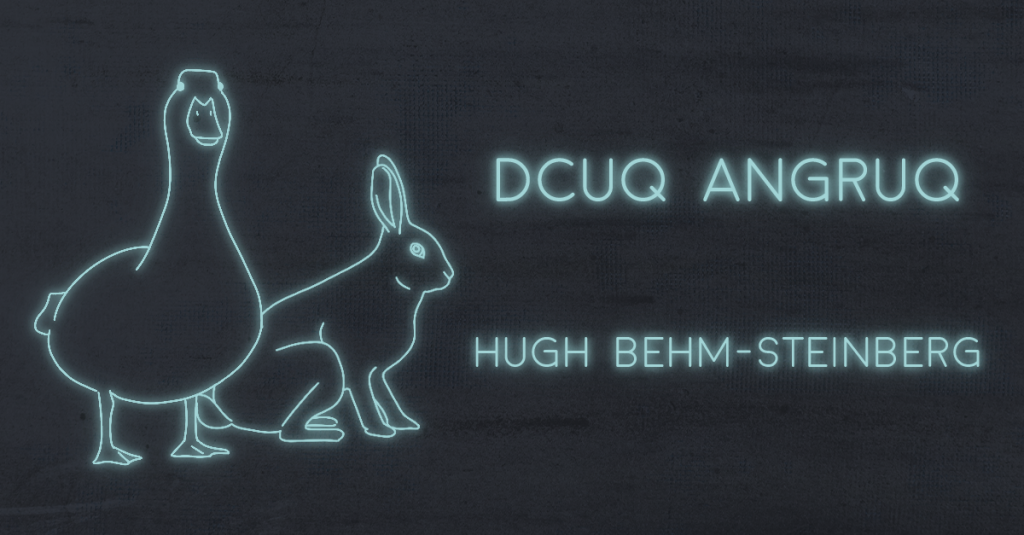A discussion in one of my classes, about metafiction, memory and torment, led me to bring up Chuck Jones’s classic cartoon, Duck Amuck. None of my students had heard of it, but that’s typical: they’re students. Still, before showing it in my next class I wanted to see the actual cartoon and not just rely on what I remembered when I first saw it as a kid. I mean who didn’t love the scene where Marvin the Martian takes Daffy aboard his flying saucer so that none of Bugs Bunny’s disintegrator blasts would ever singe his black feathers again?
But it’s in the nature of memory that details fuzz: without the cartoon in front of you, can you describe the expression upon Marvin’s golden face? Did Daffy weep one tear or two for his good fortune? I wanted to put Duck Amuck in front of my students, so that together we could see the thing itself, and untangle memory from reality.
So I tried looking for it online, first on YouTube, then Amazon, then Pirate Bay. I followed all the links my search engine grudgingly gave me, but no luck. Someone at Warner’s must have been very protective of their past, but I wasn’t going to let that stop me. I mean, it had Daffy traveling to Mars and finally meeting the true love of his life, Desdemona Duck, Queen of all Waterfowl. It was her love that at last broke Daffy from his endless cycle of disintegration/re-integration, of always returning not knowing anyone or anything, and to finally embrace certain death even if it was to be by erasure, the worst way to go out in a cartoon, and at last transcend annihilation to discover joy. It was like a recipe for enlightenment in ten minutes, thirteen seconds. It bothered me that one of the greatest cartoons of all time had been so thoroughly erased, and that no one seemed to notice.
I looked for and found seventeen Daffy Duck lovers subreddits. I got blocked on all of them.
Three thousand two hundred and fifty-one pages deep into my search I found a single pirated copy that cut off in the middle; it wobbled like someone had recorded it while drunk, holding their cellphone in front of a laptop on a speedboat. It was dubbed in Mongolian (I think?), and gave my computer a virus that required bitcoin to fix. There was an airplane in it. I don’t remember Duck Amuck ever having an airplane. Not unlike the original version, I felt like I too was being erased. I didn’t like how that felt.
Not long after that I got a call from my Chair. “I don’t know what you’ve been doing,” she said. “But knock it off.”
By this point all the ads on my browser were for Mongolian butcher shops and Viagra, and my phone kept buzzing with increasingly menacing texts from Deans and Provosts and People Who Choose to Remain Terrifyingly Anonymous. Don’t get me started on the exploding garbage trucks, or the near total absence of scenery. But the more I got the sense that someone was trying to keep me from the true Duck Amuck, the more I wanted to keep digging, because Daffy would do no less. Didn’t he fight off Bugs Bunny’s million instant Evil Martians with just a wooden practice sword to rescue his beloved Desdemona from the sewers? Surely I could save one cartoon from digital oblivion.
Finally, finally, finally, five thousand, three hundred and twenty-two pages deep into my search, I found a copy of Dcuq Angruq on a dodgy server somewhere in Southern Luxembourg. Despite the name, I knew what I had at last found. With total anticipation, I dropped the file into my video player.
My computer started whistling.
I kept waiting for the flying saucer moment where Daffy finally understands his place in the world; instead it was nothing like how I remembered it. All this version of Duck Amuck contained was just a bunch of grainy scenes where increasingly horrible things kept happening to Daffy, who had no idea why such horrible things were being done to him. No wonder it was so hard to find: it was the cartoon equivalent of a snuff film.
Smoke gushed out from every outlet of my computer, but I couldn’t stop watching.
When the cartoon sputtered to its end, there was no happy duck kissing, only Daffy writhing, crying, “Stop it, just stop it, please!”
Then the camera pulled back to reveal his tormenter to be Bugs Bunny, who was exactly the same as I remembered.
Looking up from the smoldering pile of feathers where a duck used to be, Bugs says, “Hugh, why are you watching me?”
“Have I been making you laugh?”
My name is Hugh.
The roof of my house is missing.
I see the falling shadow of an anvil approaching me. It moves wherever I move.

